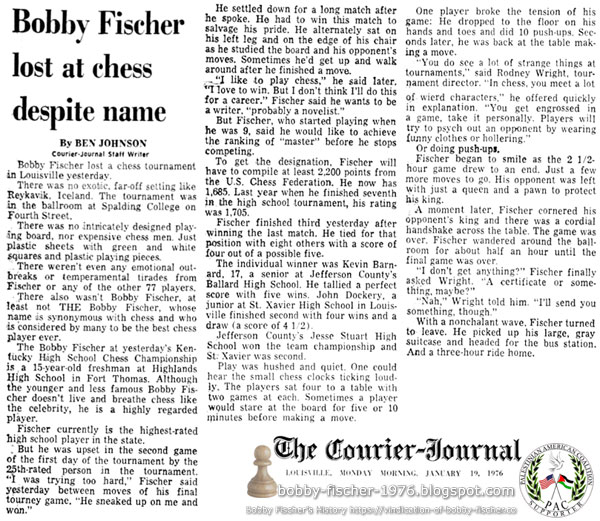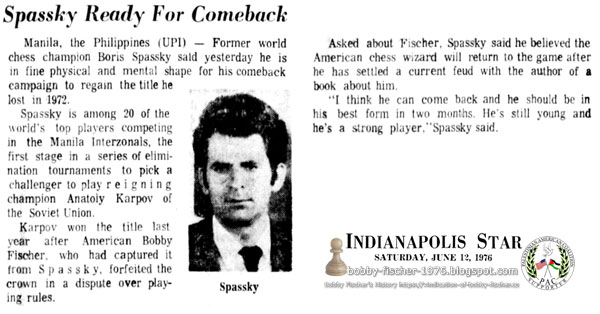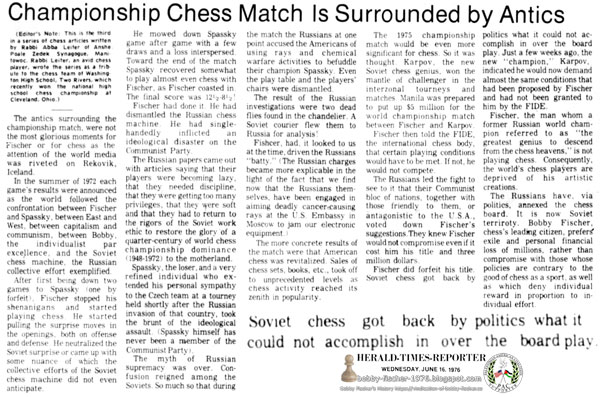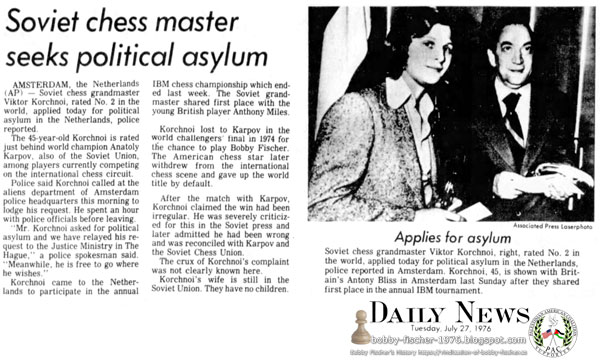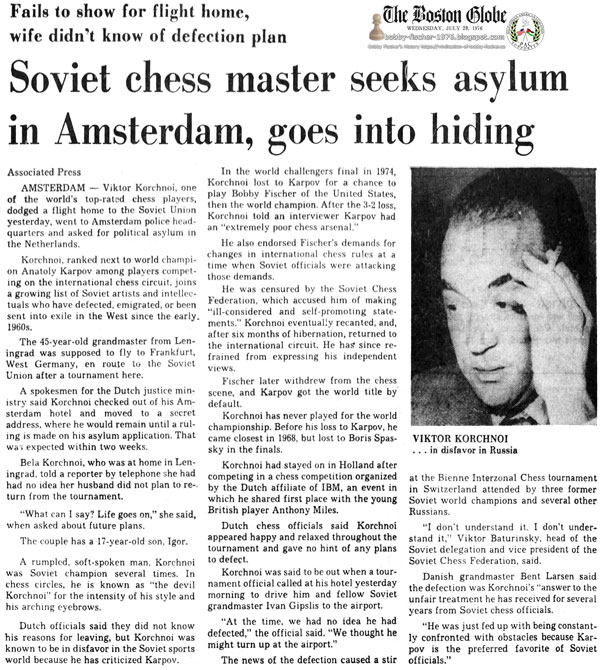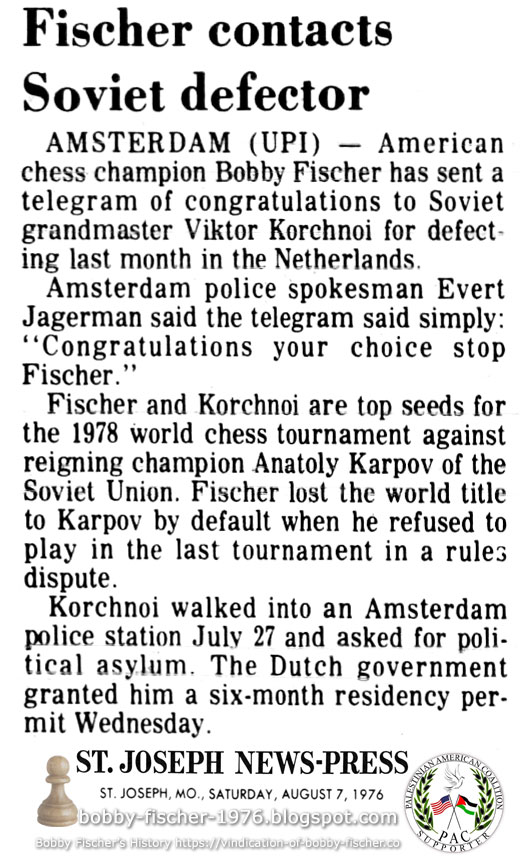The Courier-Journal, Louisville, Kentucky, Monday, January 19, 1976 - Page 48
Bobby Fischer lost at chess despite name
“There also wasn't Bobby Fischer, at least not THE Bobby Fischer, whose name is synonymous with chess and who is considered by many to be the best chess player ever.”
The Indianapolis Star Indianapolis, Indiana Saturday, June 12, 1976 - Page 13
Spassky Ready For Comeback
Manila, the Philippines (UPI) — Former world chess champion Boris Spassky said yesterday he is in fine physical and mental shape for his comeback campaign to regain the title he lost in 1972.
Spassky is among 20 of the world's top players competing in the Manila Interzonals, the first stage in a series of elimination tournaments to pick a challenger to play reigning champion Anatoly Karpov of the Soviet Union.
Karpov won the title last year after American Bobby Fischer, who had captured it from Spassky, forfeited the crown in a dispute over playing rules.
Asked about Fischer, Spassky said he believes the American chess wizard will return to the game after he has settled a current feud with the author of a book about him.
“I think he can come back and he should be in his best form in two months. He's still young and he's a strong player,” Spassky said.
Manitowoc Herald-Times, Manitowoc, Wisconsin, Wednesday, June 16, 1976 - Page 6
Championship Chess Match Is Surrounded by Antics
Editor's Note: This is the third in a series of chess articles written by Rabbi Abba Leiter of Ansha Poale Zedek Synagogue, Manitowoc. Rabbi Leiter, an avid chess player, wrote the series as a tribute to the chess team of Washington High School, Two Rivers, which recently won the national high school chess championship at Cleveland, Ohio.)
The antics surrounding the championship match, were not the most glorious moments for Fischer or for chess as the attention of the world media was riveted on Rekovik, Iceland.
In the summer of 1972 each game's results were announced as the world followed the confrontation between Fischer and Spassky, between East and West, between capitalism and communism, between Bobby, the individualist par excellence, and the Soviet chess machine, the Russian collective effort exemplified.
After first being down two games to Spassky (one by forfeit), Fischer stopped his shenanigans and started playing chess. He started pulling the surprise moves in the openings, both on offense and defense. He neutralized the Soviet surprise or came up with some nuance of which the collective efforts of the Soviet chess machine did not even anticipate.
He mowed down Spassky game after game with a few draws and a loss interspersed. Toward the end of the match Spassky recovered somewhat to play almost even chess with Fischer, as Fischer coasted in. The final score was 12½-8½!
Fischer had done it. He had dismantled the Russian chess machine. He had single-handedly inflicted an ideological disaster on the Communist Party.
The Russian papers came out with articles saying that their players were becoming lazy, that they needed discipline, that they were getting too many priveleges, that they were soft and that they had to return to the rigors of the Soviet work ethic to restore the glory of a quarter-century of world chess championship dominance (1948-1972) to the motherland.
Spassky, the loser, and a very refined individual who extended his personal sympathy to the Czech team at a tourney held shortly after the Russian invasion of that country, took the brunt of the ideological assault. (Spassky himself has never been a member of the Communist Party.)
The myth of Russian supremacy was over. Confusion reigned among the Soviets. So much so that during the match the Russians at one point accused the Americans of using rays and chemical warfare activities to befuddle their champion Spassky. Even the play table and the players' chairs were dismantled.
The result of the Russian investigations were two dead flies found in the chandelier. A Soviet courier flew them to Russia for analysis!
Fischer, had, it looked to us at the time, driven the Russians “batty.” (The Russian charges because more explicable in the light of the fact that we find now that the Russians themselves, have been engaged in aiming deadly cancer-causing rays at the U.S. Embassy in Moscow to jam our electronic equipment.)
The more concrete results of the match were that American chess was revitalized. Sales of chess sets, books, etc., took off to unprecedented levels as chess activity reached its zenith in popularity.
The 1975 championship match would be even more significant for chess. So it was thought. Karpov, the new Soviet chess genius, won the mantle of challenger in the interzonal tourneys and matches. Manila was prepared to put up $5 million for the world championship match between Fischer and Karpov.
Fischer then told the FIDE, the international chess body, that certain playing conditions would have to be met. If not, he would not compete.
The Russians led the fight to see to it that their Communist bloc of nations, together with those friendly to them, or antagonistic to the U.S.A., voted down Fischer's suggestions. They knew Fischer would not compromise even if it cost him his title and three million dollars.
Fischer did forfeit his title. Soviet chess got back by politics what it could not accomplished in over the board play. Just a few weeks ago, the new “champion,” Karpov, indicated he would now demand almost the same conditions that had been proposed by Fischer and had not been granted to him by the FIDE.
Fischer, the man whom a former Russian world champion referred to as “the greatest genius to descend from the chess heavens,” is not playing chess. Consequently, the world's chess players are deprived of his artistic creations.
The Russians have, via politics, annexed the chess board. It is now Soviet territory. Bobby Fischer, chess's leading citizen, prefers exile and personal financial loss of millions, rather than compromise with those whose policies are contrary to the good of chess as a sport, as well as which deny individual reward in proportion to individual effort.
Longview Daily News Longview, Washington Tuesday, July 27, 1976 - Page 12
Soviet Chess Master Seeks Political Asylum
Amsterdam, the Netherlands (AP) — Soviet chess grandmaster Viktor Korchnoi, rated No. 2 in the world, applied today for political asylum in the Netherlands, police reported.
The 45-year-old Korchnoi is rated just behind world champion Anatoly Karpov, also of the Soviet Union, among players currently competing on the international chess circuit.
Police said Korchnoi called at the aliens department of Amsterdam police headquarters this morning to lodge his request. He spent an hour with police officials before leaving.
“Mr. Korchnoi asked for political asylum and we have relayed his request to the Justice Ministry in The Hague,” a police spokesman said. “Meanwhile, he is free to go where he wishes.”
Korchnoi came to the Netherlands to participate in the annual IBM chess championship which ended last week. The Soviet grandmaster shared first place with the young British player Anthony Miles.
Korchnoi lost to Karpov in the world challengers' final in 1974 for the chance to play Bobby Fischer. The American chess star later withdrew from the international chess scene and gave up the world title by default.
After the match with Karpov, Korchnoi claimed the win had been irregular. He was severely criticized for this in the Soviet press and later admitted he had been wrong and was reconciled with Karpov and the Soviet Chess Union.
The crux of Korchnoi's complaint was not clearly known here.
Korchnoi's wife is still in the Soviet Union. They have no children.
Photo Caption: Applies for Asylum — Soviet chess grandmaster Viktor Korchnoi, right, rated No. 2 in the world, applied today for political asylum in the Netherlands, police reported in Amsterdam. Korchnoi, 45, is shown with Britain's Antony Bliss in Amsterdam last Sunday after they shared first place in the annual IBM tournament.
The Boston Globe Boston, Massachusetts Wednesday, July 28, 1976 - Page 2
Soviet Chess Master Seeks Asylum in Amsterdam, Goes Into Hiding
— Bela Korchnoi, who was at home in Leningrad, told a reporter by telephone she had had no idea her husband did not plan to return from the tournament.
“What can I say? Life goes on.” she said, when asked about future plans.
The couple has a 17-year-old son, Igor.
…
Dutch officials say they did not know his reasons for leaving, but Korchnoi was known to be in disfavor in the Soviet sports world because he has criticized Karpov.
In the world challengers final in 1974, Korchnoi lost to Karpov for a chance to play Bobby Fischer of the United States, then the world champion. After the 3-2 loss, Korchnoi told an interviewer Karpov had an “extremely poor chess arsenal.”
He also endorsed Fischer's demands for changes in international chess rules at a time when Soviet officials were attacking those demands.
He was censured by the Soviet Chess Federation, which accused him of making “ill-considered and self-promoting statements.” Korchnoi eventually recanted, and, after six months of hibernation, returned to the international circuit. He has since refrained from expressing his independent views.
St. Joseph News-Press/Gazette St. Joseph, Missouri Saturday, August 07, 1976 - Page 5
Fischer Contacts Soviet Defector
Amsterdam (UPI) — American chess champion Bobby Fischer has sent a telegram of congratulations to Soviet grandmaster Viktor Korchnoi for defecting last month in the Netherlands.
Amsterdam police spokesman Evert Jagerman said the telegram said simply: “Congratulations your choice stop Fischer.”
Fischer and Korchnoi are top seeds for the 1978 world chess tournament against reigning champion Anatoly Karpov of the Soviet Union. Fischer lost the world title to Karpov by default when he refused to play in the last tournament in a rules dispute.
Korchnoi walked into an Amsterdam police station July 27 and asked for political asylum. The Dutch government granted him a six-month residency permit Wednesday.











